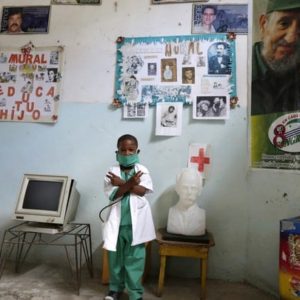Cuban Health Care: The Ongoing Revolution
296 pp, $26 pbk, ISBN 978-1-58367-860-2
By Don Fitz
Reviewed by Bob Oram for CubaSi magazine, Cuba Solidarity Campaign UK
Read the review below or at Cuba Solidarity Campaign
“After the triumph of the Revolution, Cuba set phenomenal goals, the biggest of all being the remaking of its medical system as a free service for all: health as a human right. Don Fitz comprehensively charts the 61 years that transformed Cuba’s health service into one of the best in the world, where people are placed at the very heart of the system.
If you want to understand why Cuba serves as an international reference point for health care, especially for poor countries, this is the book you need to read. It illustrates how the country achieved such a high standard in health care, despite a vicious blockade by the US throughout all of that time.
Fitz brings a knowledge of Cuban history and direct experience on the island to take us on an absorbing journey. He begins with the commitment of the 3,000 doctors who remained in Cuba after the Revolution, who despite seeing 3,000 of their colleagues leave were determined to build a new system, not just in the cities, for the rich, but for everyone and everywhere. He describes how Che’s vision of a ‘new man’ pursuing ethical values became a force for shaping this system. The birth of a nationwide medical system in 1964 saw ‘integrated’ policlinics as the entry point for all services for free.
Recalling how such universal care was, and still is a pipe dream for many poor people around the world, he then documents how it was in the 1960s that Cuba’s medical internationalism first got underway.
But it was the experience of placing policlinics at the heart of the community that enabled their limitations to be understood and paved the way for the family doctor/nurse programme. Policlinics were refocused as ‘community’ policlinics – still covering a defined area but from 1984 family doctors started living amongst their patients and often first visiting them at home.
After three decades of real progress Cuba was then threatened by forces unimaginable even as we live through a pandemic. The collapse of the Soviet Union and a ratchetting up of the blockade brought many serious challenges. Despite this, in the wake of Hurricane Mitch in 1998, Cuba embarked on the biggest transformation yet in its commitment to global health care. The Latin American School of Medicine (ELAM) was created and is well documented over three chapters.
‘The Challenges of the 21st Century’ are many, with Venezuela, homophobia and mass participation all assessed in this chapter. But with over 100 countries looking at Cuba as a model for their future, Fitz presents ten general lessons that form his idea of a ‘New Global Medicine’. Commenting on those who wring their hands at high infant mortality or lack of resources to cope with natural disasters he states “The conspiracy of silence surrounding the resounding success of Cuba’s health system is egregious, and it casts doubt on the good intentions of such organisations.”
Finally Fitz takes stock of the century’s second decade. Cuba’s work on Ebola in West Africa is covered, reaping praise worldwide and attacks from the USA with its baseless slurs of “forced human trafficking”. The inhumane blockade of Cuban biotechnology, which has so much to offer the world, is also exposed. He concludes by directly comparing the USA and Cuba which is a riveting read in the light of Covid-19. “Cuban health care was born in the context of a complete reconceptualisation of society. Its success shows that medicine must be a critical component in a bigger picture of overcoming multiple forms of oppression”. The stark contrast with its most powerful neighbour is laid bare.
Full of superb evidence-based research, written with love, Cuban Health Care tells a wonderful story which must be heard. Cuba has shown the world that a free, universal, and caring medical system can thrive. Another world really is possible.”
–Bob Oram for CubaSi Summer 2020 issue


Comments are closed.